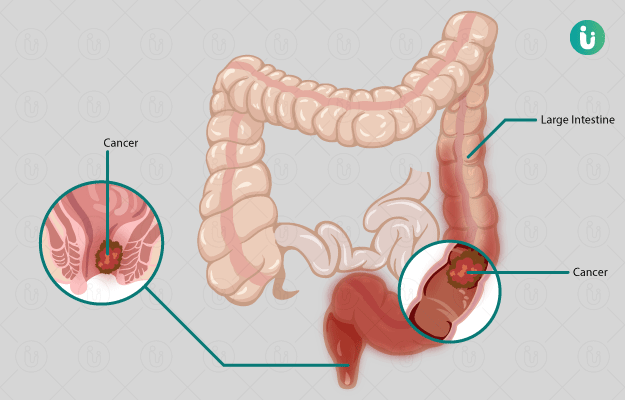What is colorectal cancer?
Colorectal cancer affects the parts of the large intestine, the colon or rectum or both, and starts as a protrusion on the inner lining of the colon or rectum. The colon absorbs excess water from the stools, and the rectum stores the stool until defecation.
The rate of incidence of colorectal cancer in India is found to be less than other countries due to the diet and low obesity rates, but the survival rate is as low as five years.
What are its main signs and symptoms?
Common symptoms seen are as follows:
- Change in bowel habits like loose stools or constipation lasting for a long duration.
- A feeling of incomplete defecation.
- Narrow-sized stools.
- Dark-coloured stool due to bleeding in the colon or rectum.
- Abdominal pain.
- Weakness.
- Unintentional weight loss.
Usually, symptoms start appearing during later stages and vary from person to person as well as the severity of the condition.
These symptoms are seen in conditions like Crohn’s disease, ulcerative colitis, haemorrhoids and infections.
Are you also troubled by obesity and are not able to lose weight even after a lot of efforts, then start using myUpchar Ayurveda Medarodh Weight Control Tablet today and control your weight.
What are the main causes?
The exact cause is not found, but the risk of developing colorectal cancer is more in:
- Men above 50 years of age.
- When colorectal cancer runs in the family of the individual.
- Obese people.
- Cigarette smokers.
- Those who consume alcohol.
- Consumers of red and processed meat.
- Persons with a diet low in fibre.
- Those with a sedentary lifestyle.
- People on immunosuppressant medicines following an organ transplant.
- Those with diseases like diabetes mellitus with insulin resistance and HIV infection.
- Individuals with prior exposure to radiation therapy, e.g., prostate cancer.
- People with a history of gallbladder removal.
- Persons with a history of coronary heart disease.
It is not necessary that you will develop cancer if you have the risk factors; however, the risk factors do increase the chance.
How is it diagnosed and treated?
Consult your doctor immediately if you experience bloody stools or rectal bleeding, which is not a normal condition.
Your doctor will perform a rectal examination to find any masses or abnormalities. He/She will carry out blood tests to check your haemoglobin, red blood cell count (which can be lowered due to blood loss) and other cell counts, liver tests and kidney tests. In the case of a recurrent disease condition, tests to find the levels of a certain antigen in the blood are carried out. Colonoscopy, a screening test for colorectal cancer is done to identify polyps. Sometimes a chest x-ray, ultrasonography and CT scan are performed to find if cancer has affected other organs.
Surgery is the first treatment option. Chemotherapeutic drugs are also given for treatment. Radiation therapy is not widely used except in certain conditions. Immunotherapy is used in the advanced stages of cancer.

 Doctors for Colorectal Cancer
Doctors for Colorectal Cancer  OTC Medicines for Colorectal Cancer
OTC Medicines for Colorectal Cancer



















